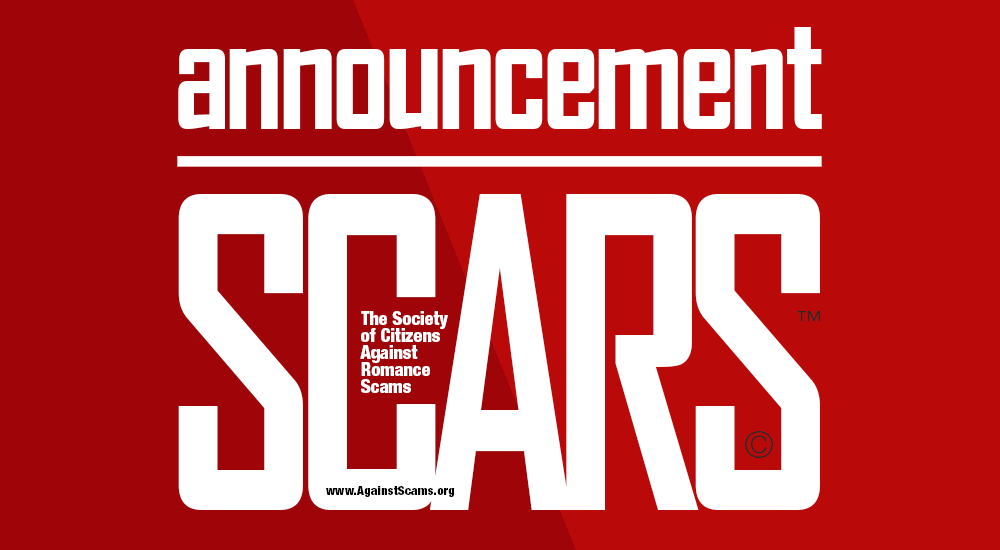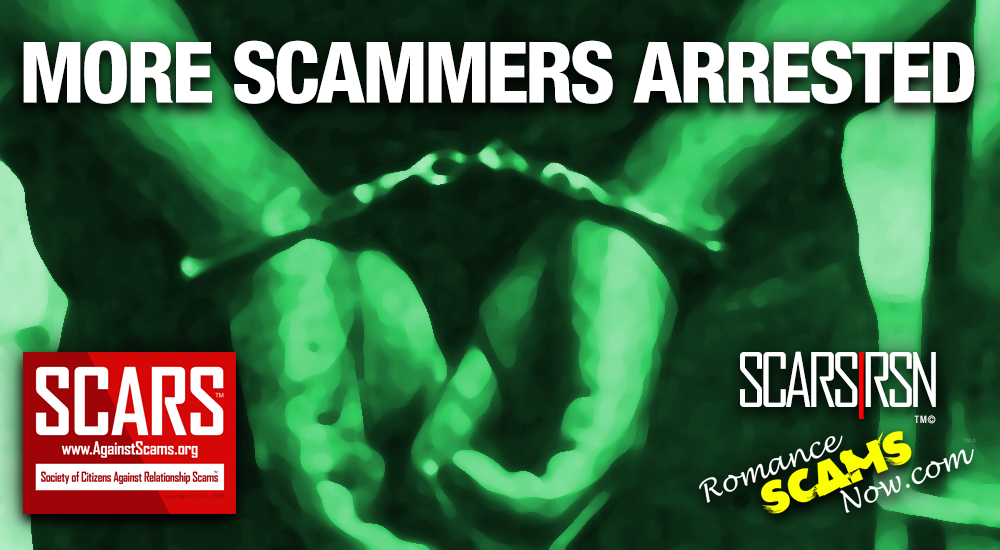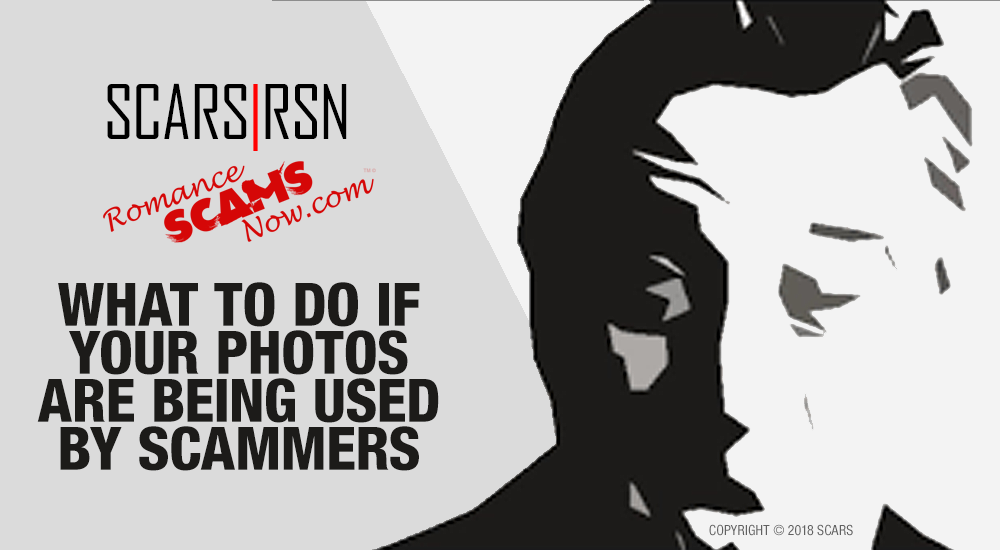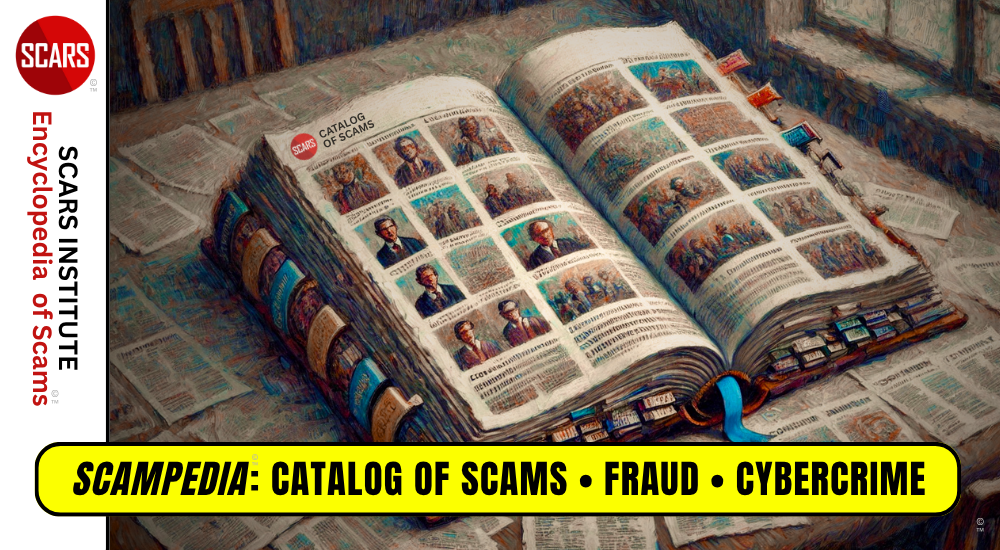
SCARS Institute’s Encyclopedia of Scams™ Published Continuously for 25 Years

What To Do If You Find That Your Photos Are Being Used By Scammers
What Should You Do?
If your photos are being used by scammers you have power!
First, it is important to understand how this happened.
You Probably Let Them Do It!
In today’s internet, you have to be in control of your privacy and who has access to your information.
Facebook, Instagram, Google, Tumblr, Picasa, Pintrest, all allow control over who can see your photos – take advantage of these controls and lock them down. If you don’t know, get your friends to help yo or Google it! Don’t just hope for the best!
When you post photos to a dating website, you have lost control, so be very careful about what you post. Once they are posted, the dating website operator has complete control of when, where, and how those photos are displayed – it’s in their Terms and Conditions agreement (just like every other website, platform, or app.)
Yes, you agreed to that!
The website, platform, or app is not liable for the misuse of your photos!*
What Do You Do After The Scammers Have Them?
You actually have power in this case, but most victims of impersonation do the wrong thing!
Most people who have had their photos stolen notify the website or platform about fake profiles and demand that they are taken down or removed. This is the wrong thing to do – because you are letting the website or platform make a decision for you.
Instead hit them with a nuke! File a copyright complaint.
Copyright Complaints
In most of the world, you own your photos and have the right to control who can or cannot copy them.
When you notify a website about an abuse they are not protected, they are not immune from liability. They have to respond or you can sue the website for copyright abuse.
Therefore, if you see a stolen photo THAT YOU own, send a copyright complaint to the website.
If you are in the United States, we have a law called the Digital Millennium Copyright Act. This allows you to force their removal if you did not place them there.
There are limitations, for example, when SCARS displays stolen photos to advise potential victims, this falls under the common “fair” use provisions because we present them for Crime Evidence Preservation and because we are a media outlet (when we act in this capacity). But a dating website or social media has no such right and you can force them to be removed and hold them liable if they refuse or reappear.
Facebook & Social Media
Each major platform has its own way to notify them about copyright infringement. You can do a Google search to find it, for example: “twitter copyright complaint” or use their internal search for “copyright complaint.”
Use their page, tools, or interface to file a complaint always first.
Before you file a complaint get organized. You will need proof that you own the photos – usually, this is the link to your original photos, typically on their platform – when they were first uploaded. Don’t try to do this from a PHONE – use a computer so you can capture links easily. If you don’t have one go ask the help of a friend or family member.
When you file a complaint, take screenshots of every page and form you fill in. If they offer an opinion to print or save your complaint do it. This is to enforce your rights later on if needed. Pay attention and get it done right.
They will take this seriously, and so should you – they have to – and they will respond.
They may ask questions, so pay attention for notifications. Respond to them.
If you have provided the proof needed, they will remove the photos and probably the offending profile too.
Keep all the information you provided, because if they were stolen once it will happen again. Once you have done it once, it is just a few minutes to do it again.
Digital Media Copyright Act
The Digital Media Copyright Act, otherwise known as the Digital Millennium Copyright Act or simply the DMCA, is a U.S. Federal copyright law that was meant to curb Internet piracy of digital media. The bill was passed in the U.S. Senate by unanimous decision on October 12, 1998 and was signed into law by President Bill Clinton seventeen days later.
Since that time, the DMCA has been implemented in many notable court cases. It is essentially the law that made it illegal to download copyrighted digital media such as music, movies, and software, and is what the RIAA and MPAA have used to combat piracy in the courts.
But it also applies to photos too!
So What Is the Digital Media Copyright Act?
So exactly what is the Digital Media Copyright Act and what’s all the commotion about? Well, the DMCA is still a heated topic today because of its use in the fight against online piracy and its effects on Internet users. But it can also help in the fight against online scammers that use photos to steal identities of others.
The DMCA is comprised of five titles and implements two treaties signed at the World Intellectual Property Organization (WIPO) Geneva conference in 1996. The five titles are as follows:
- Title I: WIPO Copyright and Performances and Phonograms Treaties Implementation Act
- Title II: Online Copyright Infringement Liability Limitation Act
- Title III: Computer Maintenance Competition Assurance Act
- Title IV: Miscellaneous Provisions
- Title V: Vessel Hull Design Protection Act
Now that’s a lot of legal wordiness and doesn’t really explain the key points of this document. Allow us to translate this for you. We will list the important points made in this law doctrine and cite examples of how they have influenced activity on the Web.
File Sharing
The illegal file-sharing of copyrighted materials is probably the most widely known and openly discussed effect of the Digital Media Copyright Act. It is illegal to host, share, or download copyrighted works, including music, movies, books, software, etc. This is what we are focused on here.
Safe Harbor
Title II of the DMCA creates a safe harbor for Internet Service Providers (ISPs) against copyright liability if they meet the guidelines and block access to ”or remove” allegedly infringing material after receiving notification from the copyright holder. In other words, after you notify the ISP or Hosting company. Remember, there are limitations, but a scammer’s use of your photo seriously qualifies.
A safe harbor is a legal term that means that as long as the ISPs comply with the copyright holder’s request (and take down the material) then they will not be held legally accountable for the infringing material.
Conclusion
In summary, the Digital Millennium Copyright Act lays the groundwork for all Internet-related copyright law and is the basis that a lot of court cases and online activities are carried out on.
Sample DMCA Notice Letter
You would send this to the Dating Website Owner/Operator or Social MediaCompany (such as Facebook) and if that fails to their hosting company!
Look up the company contact information here: Use The WHOIS Search for their Domain name
You should send this by Registered Mail – yes in an envelope – so you have a record of it being sent and received.
Insert your information below:
SAMPLE DMCA TAKEDOWN NOTICE
My name is INSERT YOUR FULL LEGAL NAME and I am the legal owner of copyrighted material described below. A website that your company hosts (according to WHOIS information) is infringing on at least one copyright owned by my company.
A photo/image of myself was copied onto your servers without permission. The original PHOTO, to which we own the exclusive copyrights, can be found at:
PROVIDE YOUR WEBSITE or SOCIAL PROFILE URL
The unauthorized and infringing copy can be found at:
PROVIDE THE DATING WEBSITE URL – THE ACTUAL PAGE ADDRESS
This letter is official notification under Section 512(c) of the Digital Millennium Copyright Act (”DMCA”), and I seek the removal of the aforementioned infringing material from your servers. I request that you immediately notify the infringer of this notice and inform them of their duty to remove the infringing material immediately, and notify them to cease any further posting of infringing material to your server in the future.
Please also be advised that law requires you, as a service provider, to remove or disable access to the infringing materials upon receiving this notice. Under US law a service provider, such as yourself, enjoys immunity from a copyright lawsuit provided that you act with deliberate speed to investigate and rectify ongoing copyright infringement. If service providers do not investigate and remove or disable the infringing material this immunity is lost. Therefore, in order for you to remain immune from a copyright infringement action you will need to investigate and ultimately remove or otherwise disable the infringing material from your servers with all due speed should the direct infringer, your client, not comply immediately.
I am providing this notice in good faith and with the reasonable belief that my rights are being infringed. Under penalty of perjury I certify that the information contained in the notification is both true and accurate, and I have the authority to act on behalf of the owner of the copyright(s) involved.
Should you wish to discuss this with me please contact me directly.
Thank you.
/s/YOUR NAME
Address
City, State Zip
Phone
You would send this to each person involved: The website operator company, the legal contacts in WHOIS, and the hosting company. Don’t worry about notifying the scammer, it will not matter and there is nothing they can do about it.
This is how this works, and if they do not do as you direct, then you have a case for a lawsuit.
REMEMBER
Remember, the scammers still have their copies of the photos, and those are not going to go away. This is why we maintain copies of the photos here, as a record of the fact that your identity has been stolen. We know it is embarrassing to see them here, and that you would want them removed also, but these photos are helping you make your case against the dating website, and against future reappearances of the photos. This is a permanent record that your identity has been stolen, and helps everyone involved identify that fact. If we have a photo of a minor child, please let us know and we will remove it.
Just remember, we all have a responsibility to help fight scammers. They are like cockroaches, and if we do nothing they only spread. It’s all about the money!
-/ 30 /-
What do you think about this?
Please share your thoughts in a comment below!
Table of Contents
- Your Stolen Photos
- What You Should Do?
- What To Do If You Find That Your Photos Are Being Used By Scammers
- What Should You Do?
- First, it is important to understand how this happened.
- What Do You Do After The Scammers Have Them?
- Copyright Complaints
- Facebook & Social Media
- Digital Media Copyright Act
- SAMPLE DMCA TAKEDOWN NOTICE
- REMEMBER
LEAVE A COMMENT?
Recent Comments
On Other Articles
- Arwyn Lautenschlager on Love Bombing And How Romance Scam Victims Are Forced To Feel: “I was love bombed to the point that I would do just about anything for the scammer(s). I was told…” Feb 11, 14:24
- on Dani Daniels (Kira Lee Orsag): Another Scammer’s Favorite: “You provide a valuable service! I wish more people knew about it!” Feb 10, 15:05
- on Danielle Delaunay/Danielle Genevieve – Stolen Identity/Stolen Photos – Impersonation Victim UPDATED 2024: “We highly recommend that you simply turn away form the scam and scammers, and focus on the development of a…” Feb 4, 19:47
- on The Art Of Deception: The Fundamental Principals Of Successful Deceptions – 2024: “I experienced many of the deceptive tactics that romance scammers use. I was told various stories of hardship and why…” Feb 4, 15:27
- on Danielle Delaunay/Danielle Genevieve – Stolen Identity/Stolen Photos – Impersonation Victim UPDATED 2024: “Yes, I’m in that exact situation also. “Danielle” has seriously scammed me for 3 years now. “She” (he) doesn’t know…” Feb 4, 14:58
- on An Essay on Justice and Money Recovery – 2026: “you are so right I accidentally clicked on online justice I signed an agreement for 12k upfront but cd only…” Feb 3, 08:16
- on The SCARS Institute Top 50 Celebrity Impersonation Scams – 2025: “Quora has had visits from scammers pretending to be Keanu Reeves and Paul McCartney in 2025 and 2026.” Jan 27, 17:45
- on Scam Victims Should Limit Their Exposure To Scam News & Scammer Photos: “I used to look at scammers photos all the time; however, I don’t feel the need to do it anymore.…” Jan 26, 23:19
- on After A Scam, No One Can Tell You How You Will React: “This article was very informative, my scams happened 5 years ago; however, l do remember several of those emotions and/or…” Jan 23, 17:17
- on Situational Awareness and How Trauma Makes Scam Victims Less Safe – 2024: “I need to be more observant and I am practicing situational awareness. I’m saving this article to remind me of…” Jan 21, 22:55
ARTICLE META
Important Information for New Scam Victims
- Please visit www.ScamVictimsSupport.org – a SCARS Website for New Scam Victims & Sextortion Victims
- Enroll in FREE SCARS Scam Survivor’s School now at www.SCARSeducation.org
- Please visit www.ScamPsychology.org – to more fully understand the psychological concepts involved in scams and scam victim recovery
If you are looking for local trauma counselors please visit counseling.AgainstScams.org or join SCARS for our counseling/therapy benefit: membership.AgainstScams.org
If you need to speak with someone now, you can dial 988 or find phone numbers for crisis hotlines all around the world here: www.opencounseling.com/suicide-hotlines
A Note About Labeling!
We often use the term ‘scam victim’ in our articles, but this is a convenience to help those searching for information in search engines like Google. It is just a convenience and has no deeper meaning. If you have come through such an experience, YOU are a Survivor! It was not your fault. You are not alone! Axios!
A Question of Trust
At the SCARS Institute, we invite you to do your own research on the topics we speak about and publish, Our team investigates the subject being discussed, especially when it comes to understanding the scam victims-survivors experience. You can do Google searches but in many cases, you will have to wade through scientific papers and studies. However, remember that biases and perspectives matter and influence the outcome. Regardless, we encourage you to explore these topics as thoroughly as you can for your own awareness.
Statement About Victim Blaming
SCARS Institute articles examine different aspects of the scam victim experience, as well as those who may have been secondary victims. This work focuses on understanding victimization through the science of victimology, including common psychological and behavioral responses. The purpose is to help victims and survivors understand why these crimes occurred, reduce shame and self-blame, strengthen recovery programs and victim opportunities, and lower the risk of future victimization.
At times, these discussions may sound uncomfortable, overwhelming, or may be mistaken for blame. They are not. Scam victims are never blamed. Our goal is to explain the mechanisms of deception and the human responses that scammers exploit, and the processes that occur after the scam ends, so victims can better understand what happened to them and why it felt convincing at the time, and what the path looks like going forward.
Articles that address the psychology, neurology, physiology, and other characteristics of scams and the victim experience recognize that all people share cognitive and emotional traits that can be manipulated under the right conditions. These characteristics are not flaws. They are normal human functions that criminals deliberately exploit. Victims typically have little awareness of these mechanisms while a scam is unfolding and a very limited ability to control them. Awareness often comes only after the harm has occurred.
By explaining these processes, these articles help victims make sense of their experiences, understand common post-scam reactions, and identify ways to protect themselves moving forward. This knowledge supports recovery by replacing confusion and self-blame with clarity, context, and self-compassion.
Additional educational material on these topics is available at ScamPsychology.org – ScamsNOW.com and other SCARS Institute websites.
Psychology Disclaimer:
All articles about psychology and the human brain on this website are for information & education only
The information provided in this article is intended for educational and self-help purposes only and should not be construed as a substitute for professional therapy or counseling.
While any self-help techniques outlined herein may be beneficial for scam victims seeking to recover from their experience and move towards recovery, it is important to consult with a qualified mental health professional before initiating any course of action. Each individual’s experience and needs are unique, and what works for one person may not be suitable for another.
Additionally, any approach may not be appropriate for individuals with certain pre-existing mental health conditions or trauma histories. It is advisable to seek guidance from a licensed therapist or counselor who can provide personalized support, guidance, and treatment tailored to your specific needs.
If you are experiencing significant distress or emotional difficulties related to a scam or other traumatic event, please consult your doctor or mental health provider for appropriate care and support.
Also read our SCARS Institute Statement about Professional Care for Scam Victims – click here to go to our ScamsNOW.com website.
















Thank you for your comment. You may receive an email to follow up. We never share your data with marketers.